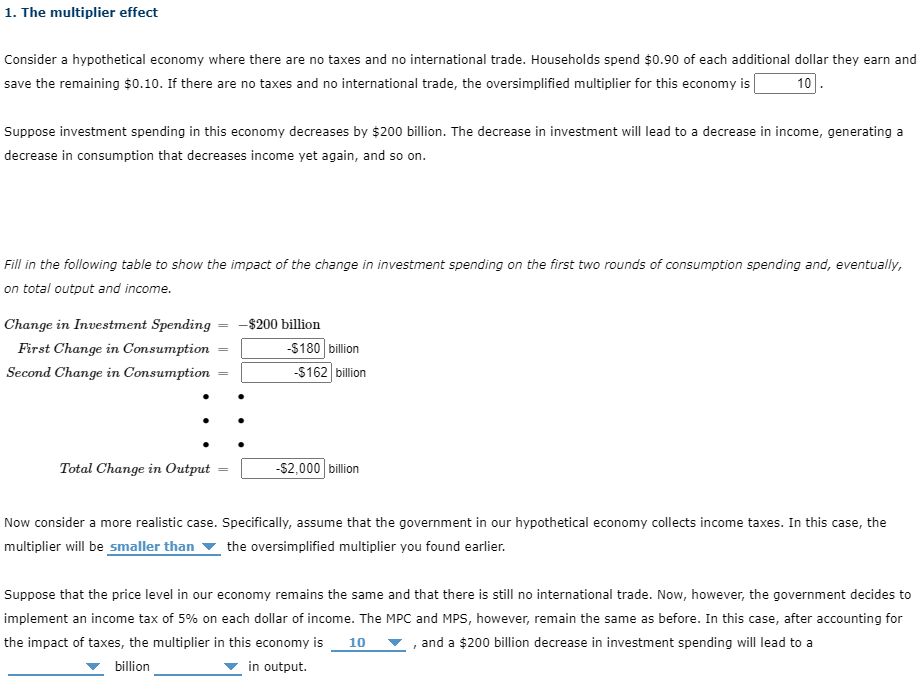onomy where there are no taxes and no international trade. Households spend $0.90 of each additio If there are no taxes and no international trade, the oversimplified multiplier for this economy is ing in this economy decreases by $200 billion. The decrease in investment will lead to a decrease in hat decreases income yet again, and so on. show the impact of the change in investment spending on the first two rounds of consumption sper ending -$200 billion mption mption Output -$180 billion -$162 billion -$2,000 billion tic case. Specifically, assume that the government in our hypothetical economy collects income taxe than the oversimplified multiplier you found earlier. el in our economy remains the same and that there is still no international trade. Now, however, the of 5% on each dollar of income. The MPC and MPS, however, remain the same as before. In this cas ultiplier in this economy is 10 and a $200 billion decrease in investment spending will le in output.
onomy where there are no taxes and no international trade. Households spend $0.90 of each additio If there are no taxes and no international trade, the oversimplified multiplier for this economy is ing in this economy decreases by $200 billion. The decrease in investment will lead to a decrease in hat decreases income yet again, and so on. show the impact of the change in investment spending on the first two rounds of consumption sper ending -$200 billion mption mption Output -$180 billion -$162 billion -$2,000 billion tic case. Specifically, assume that the government in our hypothetical economy collects income taxe than the oversimplified multiplier you found earlier. el in our economy remains the same and that there is still no international trade. Now, however, the of 5% on each dollar of income. The MPC and MPS, however, remain the same as before. In this cas ultiplier in this economy is 10 and a $200 billion decrease in investment spending will le in output.
Chapter11: Fiscal Policy
Section: Chapter Questions
Problem 1.4P
Related questions
Question
Ab 27
Economics

Transcribed Image Text:1. The multiplier effect
Consider a hypothetical economy where there are no taxes and no international trade. Households spend $0.90 of each additional dollar they earn and
save the remaining $0.10. If there are no taxes and no international trade, the oversimplified multiplier for this economy is 10.
Suppose investment spending in this economy decreases by $200 billion. The decrease in investment will lead to a decrease in income, generating a
decrease in consumption that decreases income yet again, and so on.
Fill in the following table to show the impact of the change in investment spending on the first two rounds of consumption spending and, eventually,
on total output and income.
Change in Investment Spending
First Change in Consumption
Second Change in Consumption
Total Change in Output
=
-$200 billion
-$180 billion
-$162 billion
-$2,000 billion
Now consider a more realistic case. Specifically, assume that the government in our hypothetical economy collects income taxes. In this case, the
multiplier will be smaller than the oversimplified multiplier you found earlier.
Suppose that the price level in our economy remains the same and that there is still no international trade. Now, however, the government decides to
implement an income tax of 5% on each dollar of income. The MPC and MPS, however, remain the same as before. In this case, after accounting for
the impact of taxes, the multiplier in this economy is 10 , and a $200 billion decrease in investment spending will lead to a
billion
in output.
Expert Solution
This question has been solved!
Explore an expertly crafted, step-by-step solution for a thorough understanding of key concepts.
Step by step
Solved in 3 steps

Knowledge Booster
Learn more about
Need a deep-dive on the concept behind this application? Look no further. Learn more about this topic, economics and related others by exploring similar questions and additional content below.Recommended textbooks for you

